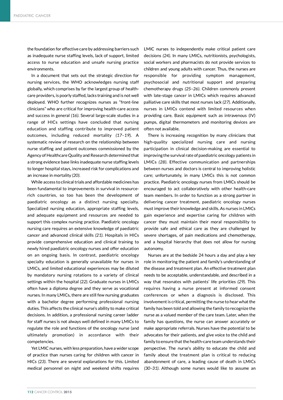
PAEDIATRIC CANCER
112 CANCER CONTROL 2015
the foundation for effective care by addressing barriers such
as inadequate nurse staffing levels, lack of support, limited
access to nurse education and unsafe nursing practice
environments.
In a document that sets out the strategic direction for
nursing services, the WHO acknowledges nursing staff
globally, which comprises by far the largest group of healthcare
providers, is poorly staffed, lacks training and is not well
deployed. WHO further recognizes nurses as "front-line
clinicians" who are critical for improving health-care access
and success in general (16). Several large-scale studies in a
range of HICs settings have concluded that nursing
education and staffing contribute to improved patient
outcomes, including reduced mortality (17-19). A
systematic review of research on the relationship between
nurse staffing and patient outcomes commissioned by the
Agency of Healthcare Quality and Research determined that
a strong evidence base links inadequate nurse staffing levels
to longer hospital stays, increased risk for complications and
an increase in mortality (20).
While access to clinical trials and affordable medicines has
been fundamental to improvements in survival in resourcerich
countries, so too has been the development of
paediatric oncology as a distinct nursing specialty.
Specialized nursing education, appropriate staffing levels,
and adequate equipment and resources are needed to
support this complex nursing practice. Paediatric oncology
nursing care requires an extensive knowledge of paediatric
cancer and advanced clinical skills (21). Hospitals in HICs
provide comprehensive education and clinical training to
newly hired paediatric oncology nurses and offer education
on an ongoing basis. In contrast, paediatric oncology
specialty education is generally unavailable for nurses in
LMICs, and limited educational experiences may be diluted
by mandatory nursing rotations to a variety of clinical
settings within the hospital (22). Graduate nurses in LMICs
often have a diploma degree and they serve as vocational
nurses. In many LMICs, there are still few nursing graduates
with a bachelor degree performing professional nursing
duties. This affects the clinical nurse's ability to make critical
decisions. In addition, a professional nursing career ladder
for staff nurses is not always well defined in many LMICs to
regulate the role and functions of the oncology nurse (and
ultimately promotion) in accordance with their
competencies.
Yet LMIC nurses, with less preparation, have a wider scope
of practice than nurses caring for children with cancer in
HICs (23). There are several explanations for this. Limited
medical personnel on night and weekend shifts requires
LMIC nurses to independently make critical patient care
decisions (24). In many LMICs, nutritionists, psychologists,
social workers and pharmacists do not provide services to
children and young adults with cancer. Thus, the nurses are
responsible for providing symptom management,
psychosocial and nutritional support and preparing
chemotherapy drugs (25-26). Children commonly present
with late-stage cancer in LMICs which requires advanced
palliative care skills that most nurses lack (27). Additionally,
nurses in LMICs contend with limited resources when
providing care. Basic equipment such as intravenous (IV)
pumps, digital thermometers and monitoring devices are
often not available.
There is increasing recognition by many clinicians that
high-quality specialized nursing care and nursing
participation in clinical decision-making are essential to
improving the survival rate of paediatric oncology patients in
LMICs (28). Effective communication and partnerships
between nurses and doctors is central to improving holistic
care; unfortunately, in many LMICs this is not common
practice. Paediatric oncology nurses from LMICs should be
encouraged to act collaboratively with other health-care
team members. In order to function as a strong partner in
delivering cancer treatment, paediatric oncology nurses
must improve their knowledge and skills. As nurses in LMICs
gain experience and expertise caring for children with
cancer they must maintain their moral responsibility to
provide safe and ethical care as they are challenged by
severe shortages, of pain medications and chemotherapy,
and a hospital hierarchy that does not allow for nursing
autonomy.
Nurses are at the bedside 24 hours a day and play a key
role in monitoring the patient and family's understanding of
the disease and treatment plan. An effective treatment plan
needs to be acceptable, understandable, and described in a
way that resonates with patients' life priorities (29). This
requires having a nurse present at informed consent
conferences or when a diagnosis is disclosed. This
involvement is critical, permitting the nurse to hear what the
family has been told and allowing the family to recognize the
nurse as a valued member of the care team. Later, when the
family has questions, the nurse can answer accurately or
make appropriate referrals. Nurses have the potential to be
advocates for their patients, and give voice to the child and
family to ensure that the health-care team understands their
perspective. The nurse's ability to educate the child and
family about the treatment plan is critical to reducing
abandonment of care, a leading cause of death in LMICs
(30-31). Although some nurses would like to assume an